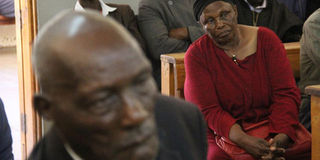Family Courts’ ‘secret justice’ offends against good reporting

Uasin Gishu politician and farmer Jackson Kibor (left), who went to court seeking to divorce his second wife Josephine Jepkoech Kibor (background), at an Eldoret Law Courts on February 7, 2017. PHOTO | FILE | NATION MEDIA GROUP
What you need to know:
Family cases, including divorce cases, should be treated like any other civil cases for the purposes of reporting.
- The Children’s Act requires that in any proceedings concerning a child, the child’s name, identity, home or school shall not be disclosed, nor shall the particulars of the child’s parents or relatives.
- When a public official is involved in a divorce case, the media has a moral duty to report the case if it is relevant to his suitability for the position.
- Family Court judges should not use their wide discretionary powers to deny the public access to cases just because they are divorce cases.
Last year, Nation readers were regaled with fascinating divorce cases — including those of Jackson Kibor, 83, who divorced his second wife of 51 years, and a wheelchair-bound Murang’a woman, Mukami Kinyugo, 73, who wants a divorce after 55 years of marriage.
The divorce cases are instructive and full of human drama. Rosemary Kuria, an advocate of the High Court of Kenya, however, drew my attention to the fact that the Daily Nation may have been reporting cases held in camera (in secret) “to protect the dignity and privacy of the parties and their families”.
Said Ms Kuria: “I know that in Nairobi courts all divorce cases are held in camera and, on the cause list and Kenya law reports, the parties’ names are initialled, e.g. B. M. vs C. M.”
But Ms Kuria said in-camera proceedings are the exception to the constitutional provision that every person has a right to have their cases resolved in a fair and open court.
She said: “So, as a general principle, hearings should be public to prevent the abuse of discretion and ensure transparency and accountability by courts.”
JUSTICE
The lawyer said she knew of a case where the court refused to have the matter heard in camera, quoting a saying by Jeremy Bentham to the effect that publicity is the very soul of justice. The English jurist said reporting court cases is the surest way of making sure that judges remain honest.
“It keeps the judge himself, while trying, under trial,” said Judge Bentham. “In the darkness of secrecy, sinister interest and evil in every shape have full swing. Only in proportion as publicity has place can any of the checks, applicable to judicial injustice, operate. Where there is no publicity, there is no justice.”
Ms Kuria said despite the requirement, that “does not prevent the exclusion of the Press and other members of the public from any proceedings, if the exclusion is necessary, in a free and democratic society, to protect witnesses or vulnerable persons, morality, public order or national security”.
MATTER OF PRACTICE
She added: “In-camera hearing of divorce cases seems to be largely a matter of practice. What I would infer is that, once a case is heard in camera, it shouldn’t be reported. However, if the parties allow it to be heard in public, they probably shouldn’t complain if the details of the hearing are published.”
Our Family Courts are, in fact, the most secretive as nearly all the cases are heard in camera. The practice offends against good news reporting and compromises the watchdog role of the media.
Family cases, including divorce cases, should be treated like any other civil cases for the purposes of reporting. They should only be held in camera where statutory law requires it.
The Children’s Act requires that in any proceedings concerning a child, the child’s name, identity, home or school shall not be disclosed, nor shall the particulars of the child’s parents or relatives.
Family cases can also justifiably be heard in camera when they are a purely domestic matter and no moral, ethical or economic matters that would be of public interest are involved.
SUSTAINABILITY
But when a public official, for example, is involved in a divorce case, the media has a moral duty to report the case if it is relevant to his suitability for the position.
Public access to the Family Courts should be denied only when public scrutiny would unfairly harm or scandalise the parties or where there is absolutely no public interest. The practice, however, seems to be that family cases are closed to the public unless the parties themselves want to go public.
Family Court judges should not use their wide discretionary powers to deny the public access to cases just because they are divorce cases. I have read numerous cases that would have made rewarding reading as news stories but the judges decided that the names of the parties should not be disclosed. This even robs the full meaning of the cases that turn out to be so important that they are used as precedents.
Send your complaints to [email protected]. Text or call 0721 989 264.




